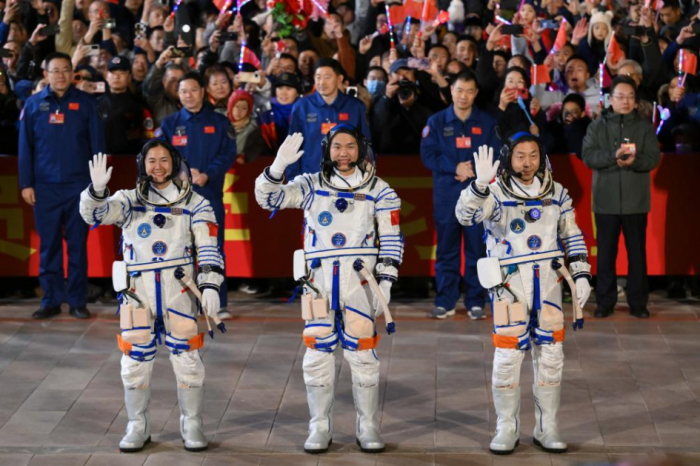The spaceship, atop a Long March-2F carrier rocket, blasted off at 4:27 a.m. (Beijing Time) from the Jiuquan Satellite Launch Center in northwest China, said the China Manned Space Agency (CMSA).
About 10 minutes after the launch, the Shenzhou-19 spaceship separated from the rocket and entered its designated orbit. The crew members are in good shape and the launch is a complete success, the CMSA announced.
The spaceship will then perform a fast, automated rendezvous and docking with the front port of the space station core module Tianhe in about 6.5 hours, forming a combination of three modules and three spacecraft.
The Shenzhou-19 crew consists of mission commander Cai Xuzhe, and astronauts Song Lingdong and Wang Haoze.
Cai is a seasoned astronaut who previously journeyed into orbit on the Shenzhou-14 mission in 2022. With this ongoing mission, he set a new record for the shortest interval between two spaceflights for Chinese astronauts.
Song and Wang, part of the third batch of Chinese astronauts, are newcomers to space, both born in the 1990s.
Wang is currently China's only female space engineer and the third Chinese woman participating in a crewed spaceflight mission, the agency noted.
The new crew has numerous tasks ahead, including conducting space science and application tests, performing extravehicular activities, installing protective devices against space debris, and managing the installation and recycling of extravehicular payloads and equipment. They will also engage in science education, public interest activities, and other payload tests, Lin Xiqiang, CMSA spokesperson, told a press conference on Tuesday.
They will carry out 86 space science research and technology experiments, covering various fields including space life science, microgravity fundamental physics, space material science, space medicine and new space technologies, Lin added.
The CMSA revealed in April that China had undertaken over 130 scientific research and application projects in its space station, while 300 scientific experiment samples had been brought back from space by manned missions in five batches.
In addition, more than 500 scientific research institutes worldwide had participated in these projects, achieving significant results in space life science, space medicine, space material science and microgravity fluid physics, with over 280 papers published in top international journals, the CMSA said.
The Shenzhou-19 astronauts will complete in-orbit rotation with the Shenzhou-18 trio and stay at the space station for approximately six months.
Cai Xuzhe told the press that he and the other two crew members have been training as a team for more than a year.
Multiple extravehicular activities are scheduled during the Shenzhou-19 mission. "We have conducted comprehensive ground training, considering all possible scenarios, learning from previous extravehicular activities and thoroughly preparing for every potential plan and contingency," Cai said.
Wang Haoze explained that she will be mainly responsible for space experimental projects, cargo management, and space station operation management.
AzVision.az
More about: China
















































